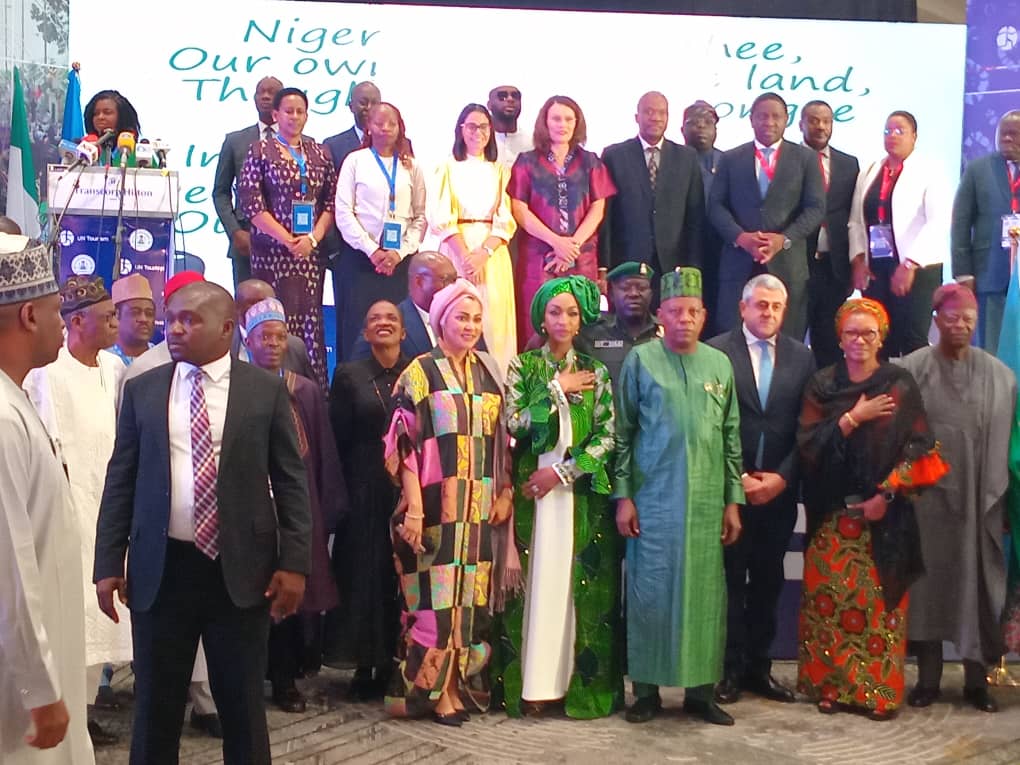President Bola Tinubu has emphasized the importance of harnessing the potential of tourism as a key driver of sustainable development in Africa.
He said the sector holds significant promise in boosting economic growth, reducing poverty, and preserving the continent’s rich cultural heritage and natural resources.
The President, who was represented by Vice President Kashim Shettima, made this known at the 68th Meeting of the UN Tourism Regional Commission for Africa (CAF) held in Abuja.
He noted that tourism goes beyond visiting historical sites, waterfalls, mountains, and parks, describing it as an engine of local economies, a catalyst for social understanding, and a force that unites cultures.
According to him, the advent of technology and creativity has transformed tourism and expanded its opportunities, making it timely for the conference to focus on the impact of artificial intelligence, innovation, and the creative industries on the tourism sector.
President Tinubu further highlighted tourism’s potential to enhance entrepreneurship and community development.
He explained that by supporting small businesses such as tour operators, local artisans, hospitality providers, and other service industries, tourism can create new avenues for income generation, especially in rural areas.
He reaffirmed Nigeria’s ambition to become a top global destination, stating that the government’s approach is rooted in sustainability, with a strong commitment to environmental protection and cultural preservation.
He stressed that the government cannot build the sector alone, noting that strategic partnerships with the private sector are essential.
He pointed out that the growing complexity and scope of tourism necessitate collaborative efforts and that Nigeria supports the adoption of sustainable tourism practices across Africa.
He called for collaboration with regional bodies such as the African Union and UN Tourism to address shared challenges and pursue common goals.
The President also encouraged other African nations to implement policies that promote eco-friendly tourism and the preservation of cultural heritage.
He said such collaboration should include the sharing of best practices, tourism training, joint marketing campaigns for sustainable tourism, and infrastructure development to support intra-African travel.
He urged participants at the event to focus on practical solutions and collaborative strategies that would strengthen travel within the continent, empower local communities, and deepen the role of tourism in achieving the Sustainable Development Goals.
In her remarks, the Minister of Art, Culture, Tourism, and the Creative Economy, Hannatu Musawa, said 2025 theme, “Boosting Social Impact and Education on Tourism through AI, Innovation and Creative Industries,” underscores President Tinubu’s commitment to the future of Africa.
She said the focus is on boldly harnessing Africa’s culture, creativity, and technology to empower its people.
Musawa noted that the global tourism industry is worth over $11 trillion, and the creative economy contributes more than $2 trillion to global GDP. Yet, she said, Africa accounts for less than five percent of global tourism revenue and less than one percent of creative exports. She emphasized that this shortfall is not due to a lack of talent or value, but rather a deficit of investment, visibility, and structural support. She called on African nations to close these gaps through joint action and innovation.
She explained that under President Tinubu’s Renewed Hope Agenda, Nigeria is pursuing a private-sector-led model. She cited a landmark partnership transforming the stretch of coastline from Takwa Bay to Badagry into a sustainable tourism corridor that blends blue economy principles with world-class leisure developments. She described these projects not just as buildings, but as symbols of a new national vision for tourism.
Musawa also spoke about the broader strategy to promote tourism through the “Destination 2030: Nigeria Everywhere” campaign. She said the government is activating a seasonal tourism calendar designed to turn cultural moments into predictable economic demand. She highlighted that events across different times of the year are being structured to attract visitors, foster cultural exchange, and energize the economy.
The Minister called for greater investment in African talent, asserting that the cultural and creative sectors now offer more enduring value than the oil and gas industries once did. She said Africa must be reimagined not merely as a collection of emerging markets but as a cultural superpower whose stories inspire the world and whose destinations redefine global tourism. She reaffirmed Nigeria’s readiness to lead and invest in this new vision.
In her welcome address, Senator Ireti Kingibe, who represents the Federal Capital Territory, described Abuja as a miniature Nigeria where all tribes and cultures are represented. She emphasized the importance of women and children as pillars of the creative economy and called for policies that support their inclusion and empowerment.
In his goodwill message, UN Tourism Secretary-General Zurab Pololikashvili expressed admiration for Nigerian culture and pledged continued support for the growth of the country’s tourism and creative sectors, with special emphasis on Nollywood.















